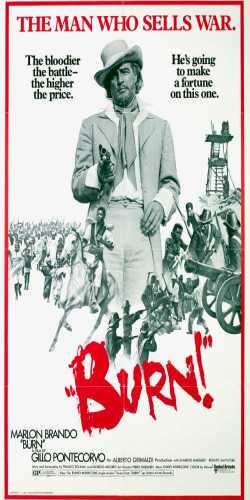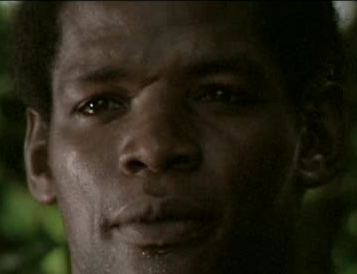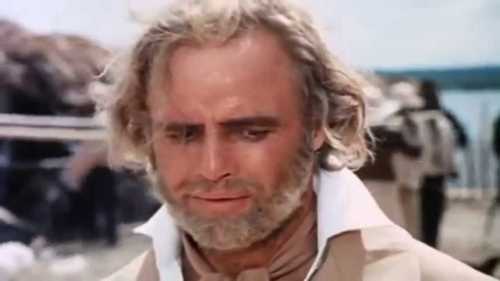At the Movies

An open thread review of current political movies!

My Open Thread is basically me wandering around looking for political movies and tv shows that are worth a damn--and, occasionally, debunking political movies that are essentially wolves in sheep's clothing, like the execrable Up In the Air.
I'll be giving y'all a review, and rating the movies on a scale of 1 to 5 Savios.

A no-Savio movie is working for the machine: destructive to truth, human rights, or continued life on this planet. A five-Savio movie is indispensable to anyone fighting the machine.
If anybody has a movie they want me to bring to the attention of the community, please send me a private message and I'll review it.
Many thanks to EyeRound, who suggested this week's movie to me, an Italian movie from 1969 called Burn! (yes, the exclamation mark is part of the title), starring Marlon Brando.

Someday I want to find out what happened in Italian cinema near the end of the 60s which spurred this intense interest in New World history, in particular the nineteenth century. The style of this movie reminds me of the so-called spaghetti westerns, filmed in Italy (for those who have never seen a spaghetti western, Clint Eastwood's cowboy movies are a good example), and it used the same musical talent that brought you this:
Hats off to Ennio Morricone, one of the greats in film music.
Like many spaghetti westerns, this story of a slave rebellion in the fictional island of Quemada begins with still photographs as the backdrop, with the sounds of gunfire punctuating the shift from picture to picture. More interestingly, the first shot you see is a simple red screen--nothing but the color red. It's only when the red peels away in splatters like blood that you can see the still photo images behind it--and the first clear image is that of a small black boy, no more than five years old, on his knees with his hands up.
It's very clear where this movie's politics are. Before the real story of the movie gets properly underway, you see multiple images of slavery that are--well, I can't say they're realistic, never having seen the real thing up close in one of our prisons, for example, but they are vivid and memorable, and gritty rather than melodramatic. The first rebel leader, for instance, is killed by putting a metal slave collar around his neck and tightening it until his throat is crushed.
But I'm getting ahead of myself. Throughout this movie, we ride around on the shoulder, essentially, of Marlon Brando's anti-heroic character, Sir William Walker.

Walker is, basically, a British secret agent sent to dislodge the Portuguese from the island and replace them with a government friendly to British interests. Before he lands, a sea captain gives him a quick synopsis of the history of the island, and, like I said, it's very clear where the movie's politics are: the island is named Quemada (burnt) because the Portuguese had to burn the island in order to subdue the indigenous people there. Unfortunately, this killed them all, so they had to import slaves from Africa (at this point, I wondered if the fictional Quemada was meant to stand in for Cuba, but the genocide of indigenous people causing a labor shortage solved by slavery was a familiar pattern across the Caribbean.)
The movie also takes the time to inform us, through the sea captain, that a rock just offshore developed its "exceptional whiteness" from the dust of the bones of dead slaves that were dumped there from slave ships.
So, this movie is powerfully against slavery, and not at all in a sentimental or cliched way. It portrays as much of the brutality of slavery and colonialism that a mainstream movie could. I haven't seen any movie equally uncompromising for a long time. Despite the brutality of the subject, it was also a pleasure to watch, once again, the lovely conventions of late 60s-early 70s cinematography. Sometimes, in movies from the late 60s and 70s, the camera does something I've only seen rarely in movies made since: a way of lingering on particular faces in a crowd that gives you a strong sense of that person as an individual, even when it's an extra with no lines. The camera refuses to let you resolve all the various individuals in the crowd into an amorphous blob, and insists on their particularity, their humanity. I think of it as being about as close as you can get to a democratic camera eye. The only movie I remember made post-1980 that makes that kind of cinematic gesture is Schindler's List. That's what's lovely about watching old movies--you can slide outside the confines of current movie conventions which can, after a time, bite into your mind like iron, particularly in an ugly age like our own, which wants to control resistance for its own purposes.
Controlled opposition is exactly the game Sir Walker is playing. In our age, what he's inciting would probably be called a color revolution. He wants to throw out Portugal by inciting a slave rebellion, after which the Portuguese colonists who want independence will take over as a provisional/puppet government backed by Britain, shutting the rebellion back up like a genie in its bottle. Walker recruits a black porter named Jose Delores (named for a real Nicaraguan general who successfully fought off the real William Walker, who was a much more sociopathic individual than the Walker in this movie) and manipulates Delores into revolting against the Portuguese.

Fictional as it is, this is the kind of narrative that made Theodore Roosevelt feel justified when he said, basically, "All the other world powers are doing it, why shouldn't we?"

Seriously, watching this movie made me think that everything the U.S. has done with the CIA in Latin America was done first by the British Empire and the East India Corporation.
Speaking of corporations, this movie does. It uncompromisingly lays out the connections between colonialism, slavery, and capitalism--but it also puts the desire of the British to end slavery in a very ugly light. Walker convinces the pro-independence planters to free their slaves in the following speech:
"Which do you prefer, or rather, which is more convenient to you gentlemen: a wife, or one of those mulatto girls? Strictly in terms of economics, what is the cost of the product? What does the product deliver? Product in this case being love--purely physical love, since sentiments obviously play no part in economics. The wife must be provided with a home, with food, with dresses, with medical attention. You're obliged to keep her a whole lifetime, even when she's grown old and perhaps a trifle unproductive. Then of course, if you have the bad luck to survive her, you have to pay for the funeral."
"Now, with a prostitute, it's quite a different matter, isn't it? You see there's no need to lodge her or to feed her, certainly not to dress her or bury her, thank god. She's yours only when you need her. You pay her only for that service. And you pay her by the hour."
"Which, gentlemen, is more important and more convenient? A slave--or a paid worker?"
These lines brilliantly critique capitalism, because the essential humanity of the hypothetical wife, the mulatto prostitute, the slave, and the worker, are reduced at the very beginning to that of a product.
This seems a good time to remember this speech:
Not only that, the identity of the men at the table is never brought into question. No one talks about how much it costs to maintain them. No one explains that they are, or are not products, because it's so obvious they're people.
As Picard once said, "Prove to the court that I am sentient."
You'll never find me advocating for slavery, or making a general critique of abolitionists, but the above argument does make me look a bit suspiciously at the British Empire. Did the British Empire really end slavery because it got a moral qualm?
William Walker (the fictional one) does actually get a moral qualm. He becomes more and more tormented by guilt as the movie progresses, becoming a walking critique of the systems he represents (like most anti-heroes worth their salt).

Before he is done, Sir William Walker will once again burn the island of Quemada, to the point that the representative of the Antilles Royal Sugar company complains that, by burning all the sugarcane fields, he has rendered the venture profitless. His answer is rather horridly prophetic of our time:
"That's the logic of profit. One builds to make money. To go on making it and make more, sometimes it's necessary to destroy."
I haven't said much about the hero of the piece, played brilliantly by Evaristo Marquez, who was a Colombian herdsman before he started a career in the movies. That's partly because I don't want to give too much away--I hope very much that all of you who read this will go onto Amazon Prime and watch it--or order the disc from Netflix (sadly, Netflix doesn't have Burn! on its streaming service). His performance hits you in the gut, especially when he talks to Black enemy soldiers (as in India, the British are relying largely, though not entirely, on native soldiers to maintain order).
I can't bring myself to give away the ending. This is too good a movie to spoil. Settle in and watch it, and have patience--movies from the 60s and 70s move at a slower pace. But perhaps that is the pace that allows the camera time to dwell with care on one dancer at a festival, one small child in a burned village, one woman hauling her belongings down a dirt road.
It's a hell of a movie, and I almost want to go back to teaching so I can put it in front of a class.
I give it 4 1/2 Savios.



 1/2
1/2
It only misses getting five because it's limited its project to describing the problem--and warning those who profit off slavery and tyranny. You can almost hear Madame Defarge's needles clicking at the end of this movie, just as, from the beginning, my mind kept moving inexorably to this scene from Norma Rae:
Damn. I can't watch that scene without tears coming to my eyes. I guess I'll have to do that one next, in case there's anyone here young enough not to have seen it.


Comments
The village must be destroyed in order to save it
haunts back here, as anti-colonial and anti-capitalist logic steps. The decision trees grow too many branches.
Bad night here. Awoke ca 7PM on the floor with guessing, over a cup of blood on the floor, in my hair, back of my shirt. After bleeding some more on my way upstairs, finally horizontal by 9:30. Crawling and scootching. Cannot CSI how long I was out. More blood on pillow. I feel fractionally better today. As a not-MD, I suspect it's heart irregularities. I had two SVT attacks after bed, self-converted. Had not had anything but H2O due to gall bladder attacks since Sunday. Started Na administration by V8 Spicy Hot, not enough maybe. Took my Diltiazem this AM and did not toss it back up.
Last night, big confusions. Better today. I am urged to go to ER @ hospital. But my daughter is an RN there, and I hear from MDs that she worries about me. If she tells them... She has too much on her plate now to be served me, again.
My hair is a mess-o-dried-blood. And I have a leg cast. Logistics may take me some time. At least one bathtub has a removable shower hose. Later.
Hey! my dear friends or soon-to-be's, JtC could use the donations to keep this site functioning for those of us who can still see the life preserver or flotsam in the water.
be careful
and take care of yourself!
“Until justice rolls down like water and righteousness like a mighty stream.”
@riverlover Riverlover, I hope you do
Riverlover, I hope you do get to a doctor. But I understand your reluctance. I hate going to the doctor myself, and it sounds like you have a few more reasons than me to want to NOT go.
"More for Gore or the son of a drug lord--None of the above, fuck it, cut the cord."
--Zack de la Rocha
"I tell you I'll have nothing to do with the place...The roof of that hall is made of bones."
-- Fiver
Good morning CStS and all
Burn! sounds interesting. I found a copy on youtube for those not on Amazon prime (which would be higher quality).
https://www.youtube.com/watch?v=tQBHr8pjGXI
Norma Rae was filmed in the neighboring town of Opelika when I was at Auburn. I know several extras- many who were kids at the time are now with kids of their own.
The organizer in the film was a real person - Si Kahn, who is also a singer song writer. http://sikahn.com/
When he organized the nearby mill in Aragon, GA. They shut down the mill when they voted to unionize. The Norma Rae story was basically true and happened in NC.
Thanks for the Burn! recommendation, and I'll look forward to a discussion Norma some time in the future.
“Until justice rolls down like water and righteousness like a mighty stream.”
@Lookout Wow, that's awesome that
Wow, that's awesome that you've got info on the real story. I'll definitely do Norma Rae next week!
Norma Rae may be my first five-Savio film.
"More for Gore or the son of a drug lord--None of the above, fuck it, cut the cord."
--Zack de la Rocha
"I tell you I'll have nothing to do with the place...The roof of that hall is made of bones."
-- Fiver
@Lookout I thought this was the
I thought this was the woman who was the basis of Norma Rae?
http://www.nytimes.com/2009/09/15/us/15sutton.html?_r=0
Actually, it's kind of cool to think of multiple people as the inspiration for Norma, because union work is always multiple--which was one of the problems Crystal Lee had with the movie, apparently. She said "the movie makes it look like it was just me that was important."
All her problems with the movie are based on a pretty sound foundation, seems to me, and yet that movie has been the breath of life to me at times over the years. I know that sounds melodramatic. But I always used to say that if I actually made it and got a job in politics in DC, these two photos would be prominently on my wall:
Sadly, there was no climbing the DC ladder for someone like me, so those photos never got hung. I guess I could put them on the wall of my rec room!
"More for Gore or the son of a drug lord--None of the above, fuck it, cut the cord."
--Zack de la Rocha
"I tell you I'll have nothing to do with the place...The roof of that hall is made of bones."
-- Fiver
Si Kahn
Was the union organizer (from up north) The Sally Field's character was a mill worker that campaigned for the union and is the one featured in you article. I'll look forward to your piece next week and also will try to watch Burn!
“Until justice rolls down like water and righteousness like a mighty stream.”
Don't mean to butt in, rl. I only
know you via cyber space. That bleeding is serious. I'm assuming you still have a gall bladder? You need to let your RN daughter know. Sure, she is stressed but she loves you. Rec'd!!
Inner and Outer Space: the Final Frontiers.
Another concussion, another blood pool.
I am still undecided if screaming off to hospital in my 5th or 6th ambulance ride will cure anything here. Depression also, zero suicide risk here. Just slow and steady. That is what I have been saying for months. A leg cast changes all in RT.
TY for concern. Family dynamics are also going to play in.
Hey! my dear friends or soon-to-be's, JtC could use the donations to keep this site functioning for those of us who can still see the life preserver or flotsam in the water.
Know that I wish you the very best! :-)
Inner and Outer Space: the Final Frontiers.
Good morning, everybody!
Sorry I'm late. I had insomnia last night.
It would be great to live in a world that didn't contribute to my insomnia, wouldn't it?
But hey, here we all are, and the sun is shining.
Greetings, companeros!
"More for Gore or the son of a drug lord--None of the above, fuck it, cut the cord."
--Zack de la Rocha
"I tell you I'll have nothing to do with the place...The roof of that hall is made of bones."
-- Fiver
I'm confused.
There was a real William Walker, but he was an American. He tried to start his own country by taking Baja California and the state of Sonora from Mexico. That failed so he went further south and tried to take over Nicaragua. That failed too and he was killed in Honduras.
wikipedia
We wanted decent healthcare, a living wage and free college.
The Democrats gave us Biden and war instead.
Wow! Another great review CSTS
This makes me happy I recommended the movie to you!
You quoted the passage about the wife / slave vs the prostitute--one that has also stuck in my mind as brilliant. I think this speech reflects Marx's observation that "regular" slaves (i.e, a wife) are actually less profitable to the capitalist than "wage slaves" (i.e., the paid prostitute). So history is actually "advancing" when the economic system abolishes the old form of slavery and replaces it with the new form of wage-earning (which is where Norma Rae would come in). But the irony is in what we mean by history "advancing": what is good--the abolition of slavery--is also and at the same time bad, because, as the Walker figure says, the employer is "liberated" from the need to feed, clothe, and bury the employee--as the slave-owner has to-- but just has to pay her / him a wage. So the worker becomes dependent on the capitalist in newer ways which make the worker's life and the slave's life very comparable. But the employer is relieved of expensive responsibilities. At the same time everybody--capitalist and worker--is more free.
Thanks also to Lookout for the youtube link (don't have Amazon Prime). It's been years since I last saw Burn! After I rec'd it to CSTS I looked for the movie on Netflix, where I had last seen it about 7 years ago. As CSTS said they aren't streaming it (but it would be great if they did!). The disc is no longer available and now listed as "unknown release date".
Thanks, CStS. I'm not too much of a movie
person, but I'll have to watch Burn!, if only via you tube and chromecast.
That, in its essence, is fascism--ownership of government by an individual, by a group, or by any other controlling private power. -- Franklin D. Roosevelt --
Thanks! Will Definitely Watch It...
The rent vs purchase wife vs prostitute is remarkably similar to a Chomsky Q&A where he rode a college student for suggesting that the rising standard of living was a sensible rationalization of neoliberal, status quo capitalism.
He said the Europeans saw it first. That it was cheaper to rent workers (wage slavery) than to own them (chattel slavery).
I wish I would have done a better job of putting breadcrumbs on important docs I've read and vids I've watched. It's a real doozy.
Can't wait to watch Brando doin' his thing in a fine film with a decent message.
“Tactics without strategy is the noise before defeat.” ~ Sun Tzu
@k9disc He is really REALLY good.
He is really REALLY good. Kind of an eye-opener to me, who only remembers him as Don Corleone.
"More for Gore or the son of a drug lord--None of the above, fuck it, cut the cord."
--Zack de la Rocha
"I tell you I'll have nothing to do with the place...The roof of that hall is made of bones."
-- Fiver